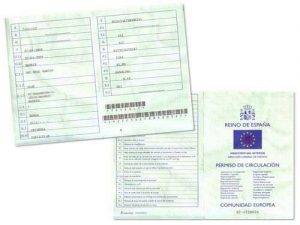Specialist Tips to Assist You Register a Foreign Vehicle in Spain Promptly
Common Challenges Dealt With Throughout Foreign Lorry Registrations and How to Conquer Them
Browsing the intricacies of international lorry registrations can be a difficult job, stuffed with challenges that vary considerably across jurisdictions. Problems such as decoding neighborhood regulations, conquering language barriers in vital paperwork, and resolving disparities in lorry requirements usually arise. Comprehending tax ramifications and compliance with safety criteria can better make complex the procedure. By analyzing efficient strategies to address these barriers, people can better position themselves for a smoother enrollment experience. The inquiry stays: what particular steps can be required to alleviate these typical pitfalls?

Comprehending Regional Laws
Navigating the intricacies of foreign automobile registration begins with a thorough understanding of neighborhood policies. Each country has its specific laws and demands regulating the enrollment of automobiles, which can differ significantly from one jurisdiction to an additional (Register a foreign Vehicle in Spain). It is important for foreign vehicle proprietors to acquaint themselves with these laws to guarantee compliance and prevent potential fines or lawful problems

Moreover, some jurisdictions mandate lorry evaluations to ascertain compliance with neighborhood safety and security and emissions standards. This might necessitate adjustments to the automobile before it can be legally signed up. Engaging with local authorities or speaking with lawful experts can provide clearness on these laws.
Language Obstacles in Paperwork
Language obstacles posture considerable obstacles when it pertains to the documents needed for international automobile registration. Numerous individuals experience troubles in understanding the details needs outlined in local regulations, as these papers are often published in the main language of the host country. False impressions can result in the submission of wrong or insufficient documents, causing delays or denial of enrollment.
Additionally, crucial records, such as title deeds, proof of ownership, and insurance plan, might not have readily available translations - Register a foreign Vehicle in Spain. This can develop confusion for international car proprietors who are not familiar with the regional terms and lawful lingo. Therefore, browsing the enrollment procedure comes to be difficult, typically needing extra effort and time to make sure conformity
To alleviate these problems, it is a good idea for foreign lorry owners to look for professional translation solutions or speak with regional professionals who can assist in recognizing the requisite documents. Furthermore, government firms may give multilingual resources or standards to help with the registration procedure. Proactively resolving language obstacles can improve the enrollment experience, guaranteeing that all required records are precisely prepared and sent based on local policies.
Automobile Requirements Disparities

Encountering automobile spec inconsistencies can create considerable obstacles for international automobile proprietors during the registration process. These disparities typically develop from distinctions in making standards, measurement devices, and regulative requirements between the automobile's native land and the host country. For example, an automobile that fulfills safety and security and exhausts requirements in one country might not align with the specs needed for registration in another, bring about hold-ups or outright rejections.
To overcome these obstacles, it is important for international automobile proprietors to conduct thorough research study before initiating the enrollment process. This consists of comprehending the details needs set by the local authorities, such as security standards, exhausts degrees, and any kind of essential adjustments. Involving with an expert service concentrating on foreign lorry enrollment can also give beneficial insights and support in browsing these discrepancies.
Paperwork plays an essential role, so making certain that all technical requirements and adjustments are accurately shown in the documentation can reduce concerns. Additionally, preserving open interaction with local enrollment authorities can offer clarity on any type of prospective disparities, enabling timely resolution and effective enrollment of the lorry.
Browsing Tax Requirements
Understanding the tax demands related to international car registration is important for owners seeking to abide with local regulations. Each jurisdiction has specific tax commitments that need to be fulfilled before a vehicle can be legally registered. These might include import duties, value-added taxes (BARREL), and annual vehicle tax obligations, which can differ substantially depending upon the car's beginning, value, and specifications.
To navigate these tax obligation demands properly, vehicle proprietors ought to start by researching the specific tax obligations relevant in their location. Consulting with regional tax obligation authorities or a tax obligation professional with experience in international car registrations can provide clearness on the procedure and prospective obligations.
Furthermore, it is important to maintain thorough paperwork of the automobile's purchase and any type of repayments made, as this will certainly be essential for tax computations and prospective audits. Owners ought to additionally be aware of any kind of target dates related to tax obligation payments to stay clear of penalties or delays in registration.
Evaluation and Compliance Issues
Frequently attending to inspection and conformity issues is crucial for proprietors of international vehicles looking for to register them in a new territory. Each area has distinctive policies regarding automobile safety, discharges, and adjustments, which can useful link posture substantial challenges for proprietors unknown with local requirements. Understanding these demands is crucial to prevent hold-ups and extra costs.
One typical problem develops when international lorries do not satisfy the host territory's security and emissions criteria. Owners ought to proactively validate that their automobiles adhere to local laws, which might entail alterations or obtaining required documents official site from manufacturers. Additionally, many territories call for a comprehensive evaluation by an authorized facility, which can lead to more problems if the car fails to meet specific standards.
To navigate these difficulties, proprietors can consult regional lorry enrollment authorities or look for aid from specialists knowledgeable about the enrollment process. Preparing all essential documents in development, including previous examination reports and evidence of conformity, can streamline the registration process. Inevitably, complete preparation and understanding of assessment requirements can considerably improve the probability why not look here of an effective international vehicle registration.
Final Thought
In recap, the procedure of foreign automobile registration requires numerous difficulties, including comprehension of local regulations, language obstacles in documents, disparities in vehicle requirements, navigation of tax obligation demands, and assessment and compliance problems. Resolving these difficulties necessitates persistent research, utilization of professional translation services, and appointment with regional authorities. Involving specialized services can make certain adherence to security and exhausts requirements, eventually assisting in a smoother enrollment process and compliance with all appropriate commitments.